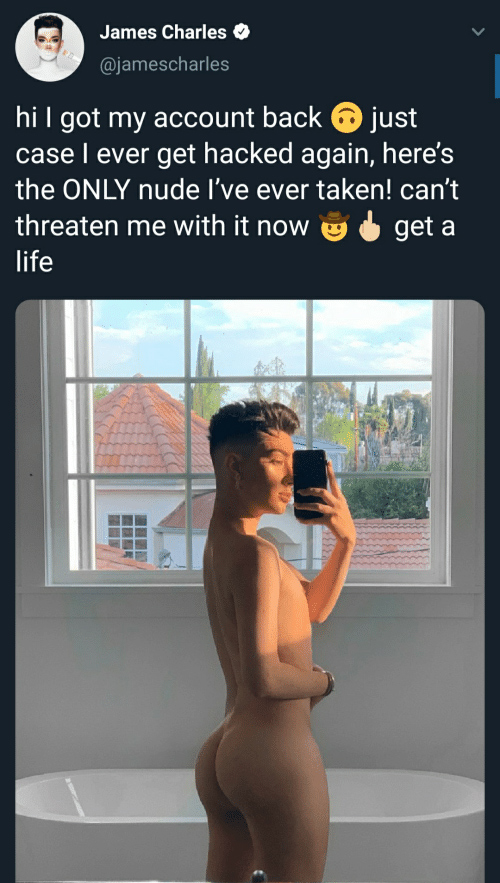James Charles Leaked - Exploring Unspoken Stories
Sometimes, information just seems to find its way out, doesn't it? It's like a quiet whisper that grows into a public conversation, or a little piece of a story that suddenly gets shared with many folks. This idea of something "leaked" can mean a lot of different things, from a tiny bit of news to a big narrative unfolding for everyone to see. It’s all about how details, whether they are about a person or a fictional creation, begin to surface.
You see, even when things start off very quietly, or when a person or a character seems to keep to themselves, bits and pieces of their existence tend to come to light. It’s a bit like how a book's plot slowly reveals itself, or how we learn more about someone as time goes on. There are always little hints, little moments, that add up to a bigger picture, or so it feels.
This discussion, you know, will look at how different sorts of information, particularly those connected to figures named James, make their way into the open. We'll pull examples from various writing situations and everyday talks to see how stories, even those that seem hidden at first, get shared. It's almost like piecing together a puzzle, where each small bit of data helps us get a fuller sense of things.
Table of Contents
- The Quiet Beginnings of a Character Named James
- How Do Stories Get Out - Pen Names and Public Personas?
- The Art of the Revealed Identity - What's in a Name? For James Charles Leaked
- What Happens When Information Comes to Light - Possessive Forms and Public Scrutiny?
- The Grammar of Public Figures - How Do We Refer to James Charles Leaked Information?
- Unpacking the Unexpected - Is It Just Luck?
- The Fortuitous Appearance of James Charles Leaked Narratives
- The Mechanics of Discussion - Where Do Conversations About James Charles Leaked Happen?
- Exploring Different Kinds of Narratives - Supernatural or Just Strange?
- When the Unseen Becomes Seen - The James Charles Leaked Phenomenon
- What About Personal Moments - When Private Becomes Public?
- The Echoes of Private Exchanges - Understanding James Charles Leaked Context
The Quiet Beginnings of a Character Named James
Imagine a character, a fellow named James, who starts his story in a very quiet way. For the first three chapters, this particular James, you know, doesn't say a single word. It's almost like he has no one to talk to, which can make a reader wonder about his inner world. This silence, in a way, is a kind of information in itself, telling us something about his situation without him uttering a sound. It sets a particular tone for his story, making us curious about what might eventually bring him to speak, or what sort of connections he might form later on.
When we think about someone like this James, who keeps things so close to the chest, it makes you consider how much of a person's story is told through their actions, or even their lack of actions, rather than just their words. This kind of character introduction, honestly, leaves a lot of room for a writer to let details unfold slowly. It’s a deliberate choice to hold back information, making any eventual revelation, or "leaked" bit of his personality, feel more impactful. So, in some respects, his silence is a very loud statement.
Personal Details - Our Character, James
| Name | James |
| Role in Story | Main character |
| Early Behavior | Doesn't speak for the first three chapters |
| Reason for Silence | Has no one to talk to, it seems |
How Do Stories Get Out - Pen Names and Public Personas?
It's fascinating, isn't it, how some well-known authors use different names for their writing? It's like they have one public persona for one kind of story and a completely different one for another. Think about J.K. Rowling, for instance, who is famous for her tales aimed at young people. Then, she also writes adult thrillers under the name Robert Galbraith. Or Nora Roberts, who pens romance novels, but also writes as J.D. Robb. This choice to use various names, in a way, lets them release different types of narratives, or "leak" different facets of their creative spirit, without confusing their audience. It seems to work for them, too, allowing their work to be categorized more easily, and perhaps even giving them a bit more freedom to explore new ideas.
This practice really makes you consider how information about a creator, or a creation, comes to light. When an author uses a pen name, they are, in a sense, controlling the flow of information about their work. They decide which stories are associated with which identity. It’s a deliberate act of managing how their narrative is received by the world. This is very different from, say, something just suddenly appearing without control. It shows that even when information is released, there can be a lot of thought behind how it's presented, and to whom. So, it's not always about things just spilling out; sometimes, it's a very careful release.
The Art of the Revealed Identity - What's in a Name? For James Charles Leaked
When we talk about something like "James Charles leaked" information, we are really discussing how a person's identity, or details about them, become public. It makes you think about how names themselves carry weight. Is it the name that gives the information its impact, or the content of the information itself? For writers, choosing a name for a character, or even a pen name for themselves, is a big decision. It shapes how readers perceive the story or the person behind it. The way a name is used can, in a way, guide how the narrative unfolds, or how those "leaked" bits of character are understood. It's about perception, isn't it?
The name itself can almost be a container for all the stories and details associated with it. When information related to a name like "James Charles leaked" into the public sphere, it instantly attaches itself to that identity. This connection is powerful, and it shapes how people talk about what's been revealed. It's a bit like how a character's name in a book immediately brings to mind all their actions and personality traits. So, the name acts as a central point for all the narratives, whether they are carefully crafted or seemingly just appear.
What Happens When Information Comes to Light - Possessive Forms and Public Scrutiny?
When information about someone, let's say about James, becomes public, how do we even talk about it? This brings up an interesting point from what I learned in school about writing the possessive form of names. For a name like James, which ends in 's' but is singular, there are usually two ways to show possession. You can add an apostrophe and an 's' (James's), or just an apostrophe (James'). This might seem like a small detail, but it speaks to how we linguistically handle ownership or association with a person, especially when their "stuff" or "information" is being discussed. It’s about attributing something to them, or so it seems.
The choice between James's and James' really comes down to what feels right for the overall tone and voice of the story or conversation. If we're talking about "James Charles leaked" information, the way we phrase it, the way we show that information belongs to or is about James Charles, can subtly change how it's received. It's a bit like deciding how formal or informal you want to be when sharing something that has come to light. The grammatical choice, in a way, reflects the nuance of how we present these pieces of information, and how we want others to connect them back to the individual. It's a subtle but really important part of how narratives are constructed around people.
The Grammar of Public Figures - How Do We Refer to James Charles Leaked Information?
Thinking about the grammar of how we talk about something like "James Charles leaked" information, it's more than just an academic exercise. It points to how we attribute details to a public figure. When something "leaks," it becomes associated with that person, and the way we write or speak about it reflects that connection. Do we say "James Charles's video" or "James Charles' video"? This choice, you know, might influence how directly we link the information to the person. It's about clarity and convention, really, in how we handle these public associations.
The very act of using a possessive form implies a connection, a kind of ownership or direct relation. When we discuss "James Charles leaked" content, we are inherently tying that content back to him through our language. This grammatical link, in a way, reinforces the idea that the information, once out, becomes a part of his public story. It's about how language shapes our perception of what has been revealed, and how that revelation fits into the larger picture of a public persona. So, how we phrase things matters a good deal.
Unpacking the Unexpected - Is It Just Luck?
Sometimes, the way things come together, or how a particular piece of information surfaces, feels like pure chance. There's a thought that it was simply luck that brought a character named James into a story, or that luck played a part in certain events unfolding. This idea suggests that some revelations, or some instances of "leaked" information, might not be planned at all. They just happen to appear, almost as if by accident, and then become part of the ongoing narrative. It's a bit like stumbling upon a hidden detail that suddenly makes a whole lot of sense, or so it seems.
When something appears unexpectedly, it can have a big impact because it wasn't anticipated. If we think about how "James Charles leaked" details might emerge, sometimes it could feel like a random occurrence that just happens to shed light on something new. This element of chance can make the information feel more authentic, perhaps, because it wasn't deliberately put out there. It makes you consider how much of what we learn about public figures, or even fictional characters, is a result of careful planning versus pure happenstance. So, the role of luck, or what appears to be luck, can be pretty significant in how stories unfold.
The Fortuitous Appearance of James Charles Leaked Narratives
The idea of a "fortuitous appearance" suggests that certain narratives, or bits of information, simply show up at the right moment, almost as if by good fortune. When we consider how "James Charles leaked" information might become known, it could be that some of it just surfaces through unexpected channels, or at times when it gains the most attention. This kind of spontaneous revelation, in a way, often captures public interest because it feels less manufactured. It’s like finding a missing piece of a puzzle you didn't even know you were looking for, which is pretty interesting.
These unexpected disclosures can shape how a person's story is told, adding layers that weren't part of any official narrative. The "luck" involved in such appearances means that the timing and nature of the "leaked" information can be quite unpredictable. It adds a certain organic feel to the way public stories develop, showing that not everything is controlled or pre-planned. So, sometimes, the most impactful revelations are those that just happen to come out, rather than being intentionally released.
The Mechanics of Discussion - Where Do Conversations About James Charles Leaked Happen?
When information about someone, or something like "James Charles leaked" content, comes out, where do people go to talk about it? We see this happen in various places, like online forums where folks gather to discuss specific topics. For example, there are discussions labeled "word mechanics" started by people like James E. This shows that when new information or ideas appear, people naturally want to dissect them, to understand them, and to share their thoughts. It's a bit like a town square, but for ideas and news, you know.
These discussion spaces, whether they are online threads or real-life conversations, become the venues where the "leaked" information is processed and interpreted. Someone might post an introduction, like "Hi guys and girls, I'm new here, so hello," wanting to share a personal perspective in the first person. This shows a desire to contribute to the ongoing conversation, to add their piece to the collective understanding of what has been revealed. It's where the initial bits of information get expanded upon, debated, and really, given life by public engagement. So, these forums are pretty important for how information spreads and evolves.
Exploring Different Kinds of Narratives - Supernatural or Just Strange?
When we talk about stories, especially those that fall under the general definition of horror, like weird fiction, it makes you think about different kinds of revelations. What do people consider the differences between supernatural events and just strange occurrences? This distinction is a bit like trying to figure out if "James Charles leaked" information is truly shocking and beyond explanation, or just unusual and unexpected. It's about the nature of the information itself, and how it challenges our usual way of seeing things. Are these revelations something truly out of the ordinary, or just a different angle on what we thought we knew?
This kind of discussion shows that when new information comes to light, people try to categorize it, to put it into a box that makes sense. Whether something is labeled "supernatural" or "weird" depends on how far it pushes the boundaries of our normal experiences. Similarly, when "James Charles leaked" details surface, people will try to understand if they are truly scandalous, or just a peek into a different side of a public figure. It's all about how we interpret the unexpected, and where we draw the line between what's normal and what's truly surprising. So, our perceptions really shape the story.
When the Unseen Becomes Seen - The James Charles Leaked Phenomenon
The idea of something unseen suddenly becoming visible, or a "James Charles leaked" phenomenon, is very much about information that was once private or hidden now being out in the open. It’s like a curtain being pulled back, revealing something that was previously kept from view. This shift from unseen to seen can be quite impactful, changing how we understand a person or a situation. It's not just about the information itself, but the act of it becoming public, which creates a whole new dynamic, you know.
This "phenomenon" of information coming to light often sparks a lot of conversation and reaction. It's about how something that was not meant for public consumption suddenly becomes a topic of widespread interest. Whether it's a piece of personal news or a creative detail, the moment it moves from private to public, it takes on a different kind of life. So, the act of something being "leaked" is, in a way, the transformation of private knowledge into a public event, which can be pretty significant.
What About Personal Moments - When Private Becomes Public?
Sometimes, very personal moments, like a fight or a breakup, can end up becoming public knowledge. There's an example of James Berkley from Massachusetts, USA, who mentioned a fight he had when he and someone were dating, with a public incident happening after they broke up. This shows how private exchanges can, in a way, spill out into the public sphere, becoming part of a wider conversation. It's a very real aspect of how personal stories can become public narratives, whether intended or not. So, what happens behind closed doors can sometimes find its way out.
These kinds of revelations, where private details become

James Charles Nude Ass Pic Leaked By Him - Scandal Planet

James Charles Nude Ass Pic Leaked By Him - Scandal Planet

James Charles Nude Ass Pic Leaked By Him - Scandal Planet